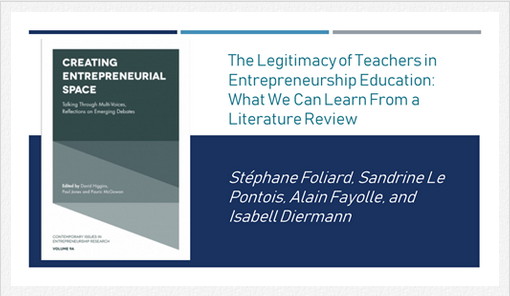The Legitimacy of Teachers in Entrepreneurship Education: What We Can Learn From a Literature Review; Stéphane Foliard, Sandrine Le Pontois, Alain Fayolle, and Isabell Diermann
[Un chapitre à paraître ]
Chapter 1. The Legitimacy of Teachers in Entrepreneurship Education: What We Can Learn From a Literature Review; Stéphane Foliard, Sandrine Le Pontois, Alain Fayolle, and Isabell Diermann
https://books.emeraldinsight.com/page/detail/Creating-Entrepreneurial-Sp…
Abstract : Entrepreneurship teachers (ETs) evolve in an environment where different categories of people interact: students, teachers, stakeholders. Assuming one or more identities or roles, teachers, practitioners, ex-entrepreneurs and/or researchers are the ‘transmitters’ of EE. The question of recognition of teachers’ professional status is not always addressed (Hargraves, 2000). Scientific research in EE shows certain weaknesses (Byrne, Fayolle, & Toutain, 2014; Fayolle, 2013), notably, a lack of interest in questions of i) the perceived legitimacy of ETs, and ii) the support they receive in carrying out their work (particularly professional development). Taking a decidedly multidisciplinary perspective, this chapter aims to deal with the question of the perceived legitimacy of ETs using a literature review that covers all disciplines having shown an interest in the notion of teacher legitimacy.
The legitimacy of EE depends on the interactions between legitimate instructors and legitimate students in a given context, which respects certain collectively accepted norms. It also depends on the context and the objective of EE. Following the example of a university hospital worker (doctor), ETs can be practitioners, teachers and researchers. Their degree of expertise, position in the institution, positioning in relation to other actors – students, peers, colleagues, institutional and professional stake holders – and the discourse they use are the elements that constitute their legitimacy.

